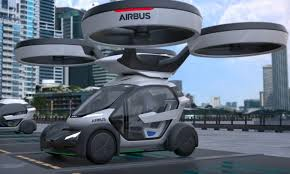
Breaking News
 Pentagon To Send 200 Troops to Nigeria
Pentagon To Send 200 Troops to Nigeria
 Trump Says He May Send Second Aircraft Carrier to Middle East To Prepare for Potential Attack...
Trump Says He May Send Second Aircraft Carrier to Middle East To Prepare for Potential Attack...
 A Market Crash and Recession Are Bullish, Not Bearish
A Market Crash and Recession Are Bullish, Not Bearish
 What Are They Still Hiding? New Epstein Questions Point to a Much Bigger Cover-Up
What Are They Still Hiding? New Epstein Questions Point to a Much Bigger Cover-Up
Top Tech News
 Drone-launching underwater drone hitches a ride on ship and sub hulls
Drone-launching underwater drone hitches a ride on ship and sub hulls
 Humanoid Robots Get "Brains" As Dual-Use Fears Mount
Humanoid Robots Get "Brains" As Dual-Use Fears Mount
 SpaceX Authorized to Increase High Speed Internet Download Speeds 5X Through 2026
SpaceX Authorized to Increase High Speed Internet Download Speeds 5X Through 2026
 Space AI is the Key to the Technological Singularity
Space AI is the Key to the Technological Singularity
 Velocitor X-1 eVTOL could be beating the traffic in just a year
Velocitor X-1 eVTOL could be beating the traffic in just a year
 Starlink smasher? China claims world's best high-powered microwave weapon
Starlink smasher? China claims world's best high-powered microwave weapon
 Wood scraps turn 'useless' desert sand into concrete
Wood scraps turn 'useless' desert sand into concrete
 Let's Do a Detailed Review of Zorin -- Is This Good for Ex-Windows Users?
Let's Do a Detailed Review of Zorin -- Is This Good for Ex-Windows Users?
 The World's First Sodium-Ion Battery EV Is A Winter Range Monster
The World's First Sodium-Ion Battery EV Is A Winter Range Monster
 China's CATL 5C Battery Breakthrough will Make Most Combustion Engine Vehicles OBSOLETE
China's CATL 5C Battery Breakthrough will Make Most Combustion Engine Vehicles OBSOLETE
Airbus looking at large drones, flying cars with tests starting 2023

The company is investing in two UAM research programs, CityAirbus, being developed in Europe by Airbus Helicopters under the group's chief technology office (CTO), and the Vahana being developed by the company's Silicon Valley offshoot, A3.
Airbus has already carried out a successful trial in São Paulo of its helicopter ride-hailing service Voom, which aims to ease congestion by making helicopter travel more accessible and affordable. Elsewhere, teams from Silicon Valley to Europe and Asia are working to create entirely new vehicles. CityAirbus is an electric vertical take-off and landing (VTOL) vehicle for up to four passengers, while Vahana aims to create a similar mode of transport for individual travellers or cargo transport. In Singapore, the company is working with the country's National University on the Skyways project to test a parcel transport system using autonomous drones.
While each mission has its own individual requirements, Thomsen says there is an overlap of several core technologies Airbus is developing. "Quite simply, in today's environment, any new solution has to be electrically driven, so batteries and charging stations are indispensable. Vahana and, eventually, CityAirbus will be autonomous to help facilitate safe operation in busier airspace, making reliable sense-and-avoid technology an important aspect.



